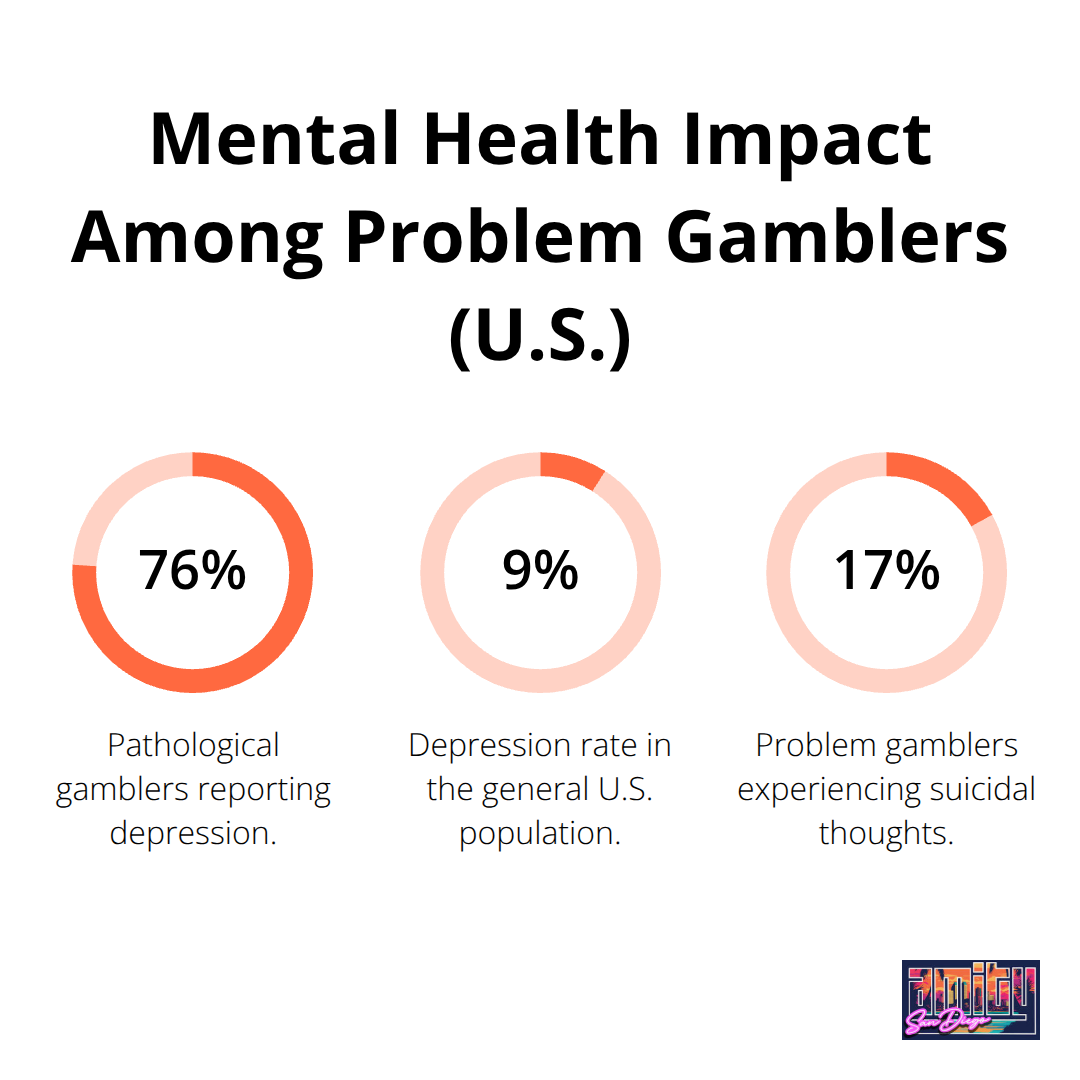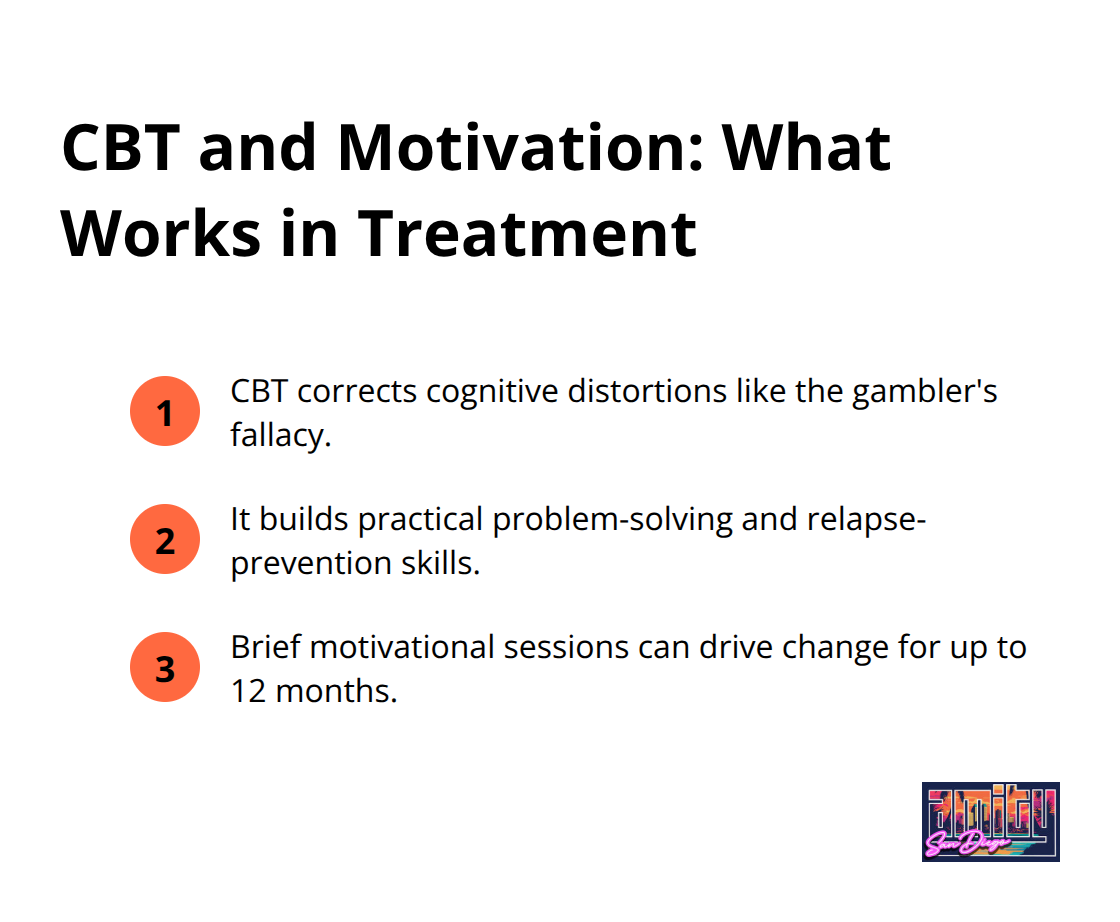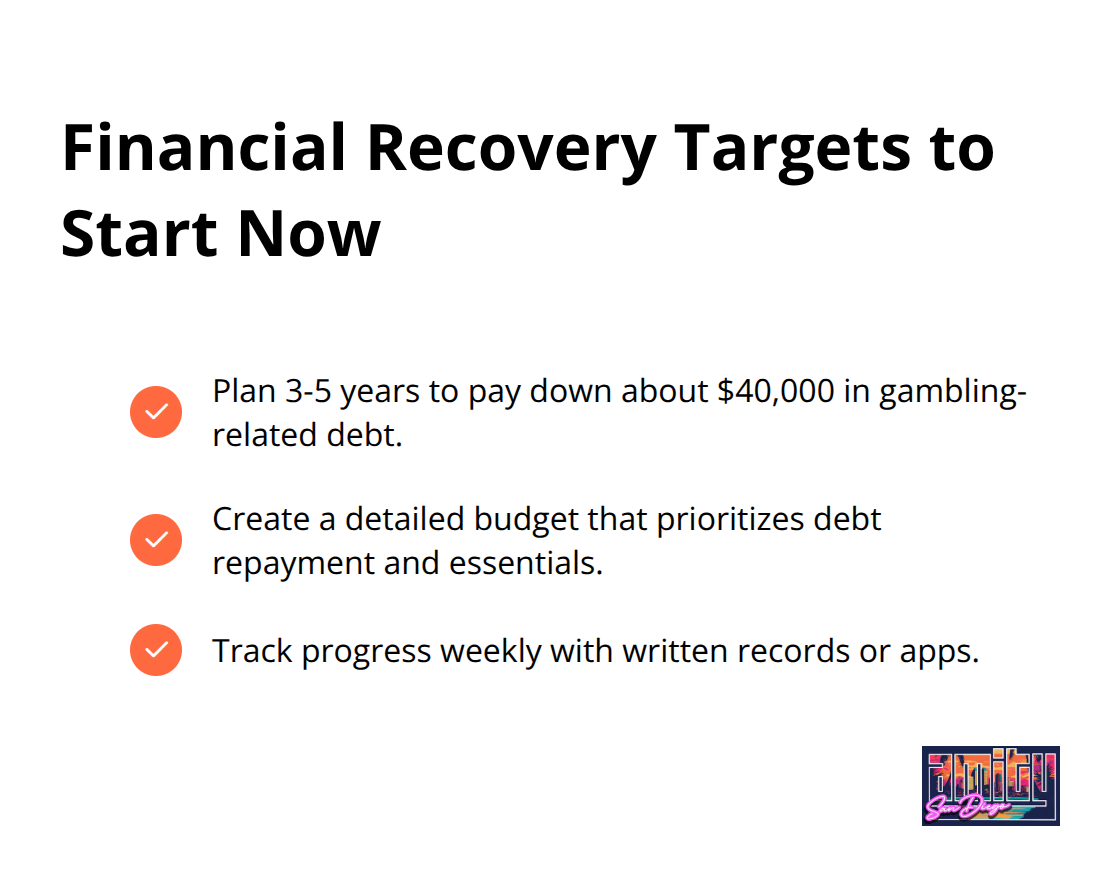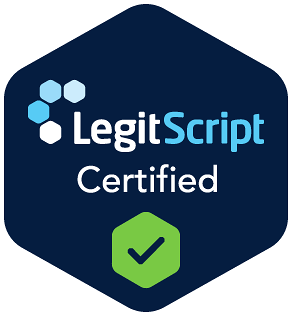Problem gambling affects over 2 million Americans, with many struggling to find effective recovery paths. The financial losses average $55,000 per person, while relationships and mental health deteriorate rapidly.
We at Amity San Diego understand that creating a comprehensive gambling addiction treatment plan requires professional guidance and structured support. This guide outlines the essential steps to build your personalized recovery strategy.
What Are the Real Warning Signs of Gambling Addiction?
Gambling addiction destroys lives through a predictable pattern of escalating behaviors and devastating consequences. The National Council on Problem Gambling reports that individuals with gambling disorders also experience other mental health conditions, particularly depression and anxiety disorders. Early warning signs include lies about gambling activities, repeated money borrowing, and withdrawal symptoms like irritability and restlessness when someone cannot gamble. Men face twice the risk of developing severe gambling problems compared to women, with those who have family histories of gambling showing significantly higher susceptibility rates.
Physical and Mental Health Deterioration
Chronic gambling triggers severe physiological stress responses that mirror those found in substance addiction. Sleep disorders affect problem gamblers, while chronic headaches and gastrointestinal issues become common as stress hormones remain consistently elevated. Depression rates among pathological gamblers reach 76%, compared to 9% in the general population according to research from the National Epidemiologic Survey. Suicidal thoughts occur in approximately 17% of problem gamblers (making immediate professional intervention necessary when these symptoms appear).

Financial Devastation and Relationship Collapse
Problem gamblers accumulate an average debt of close to $40,000 before they seek treatment, with many who liquidate retirement accounts, take cash advances, and engage in illegal activities to fund their addiction. Divorce rates among pathological gamblers exceed 50%, while domestic violence incidents increase by 300% in households affected by gambling disorders. Children of problem gamblers show higher rates of depression, anxiety, and academic problems, with 25% who develop gambling issues themselves. Financial recovery typically requires 3-5 years of structured debt management even after someone achieves gambling abstinence.
The Progression Pattern
Gambling addiction follows three distinct phases that professionals recognize in treatment settings. The winning phase creates false confidence through early wins (often called “beginner’s luck”), which reinforces the belief that gambling provides easy money. The losing phase begins when losses mount, leading to increased bet sizes and more frequent gambling sessions to recover losses. The desperation phase marks complete loss of control, where individuals gamble with money they cannot afford to lose and engage in increasingly risky behaviors to continue gambling.
These warning signs and progression patterns form the foundation for understanding why professional assessment becomes necessary for effective addiction treatment San Diego planning.
What Medical Support Does Effective Treatment Require?
Professional gambling addiction treatment demands comprehensive medical evaluation that addresses both gambling behaviors and co-occurring mental health conditions. Research shows that individuals with gambling disorders experience high rates of comorbidity with substance and alcohol use disorders, mood and anxiety disorders, which makes dual diagnosis assessment mandatory rather than optional. A thorough medical evaluation includes screening for depression, anxiety disorders, substance abuse, and suicidal ideation, as these conditions directly impact treatment effectiveness and recovery outcomes.
Cognitive Behavioral Therapy Delivers Strongest Results
Cognitive Behavioral Therapy remains the gold standard for gambling addiction treatment, helping patients acquire specific skills using exercises introduced in each therapy session. CBT addresses cognitive distortions like the gambler’s fallacy while it teaches practical problem-solving skills and relapse prevention strategies. Motivational enhancement therapy provides additional support, with research that indicates even single sessions can produce lasting behavioral changes for up to 12 months.

Individual vs Group Therapy Options
Group therapy sessions cost significantly less than individual treatment while they provide peer accountability and shared experiences. Individual therapy allows deeper exploration of personal triggers and trauma histories (which often drive gambling behaviors). Most treatment centers integrate both approaches based on individual assessment results and client preferences, as each method offers distinct advantages for different personality types and recovery stages.
Support Groups Provide Essential Long-Term Structure
Gamblers Anonymous operates chapters nationwide with the proven 12-step model, though research shows limited long-term abstinence rates among members. This highlights why professional treatment combined with peer support produces better outcomes than either approach alone. Gam-Anon serves family members who need their own recovery support, as gambling addiction affects entire family systems through financial stress and broken trust.
Crisis Intervention and Ongoing Support
Online support groups and telephone helplines like the National Problem Gambling Helpline provide 24/7 crisis intervention between formal treatment sessions. These resources become particularly valuable during high-risk periods when gambling urges intensify (such as after receiving unexpected money or during emotional stress). The combination of professional therapy, peer support, and crisis resources creates the comprehensive foundation needed to develop personalized recovery strategies and long-term success plans.
For those seeking comprehensive addiction treatment San Diego, professional medical support remains essential for lasting recovery success.
How Do You Build Your Personal Recovery Plan?
Recovery success depends on creating specific, measurable goals rather than vague intentions to stop gambling. Research shows that individuals who set concrete recovery milestones achieve better outcomes than those without structured goals. Start with immediate objectives like removing gambling apps from your phone, closing online betting accounts, and installing website blockers within your first week.
Set Clear Financial Recovery Targets
Financial goals should include specific debt reduction targets (with the average problem gambler requiring 3-5 years to recover from gambling-related debt averaging $40,000). Create a detailed budget that allocates specific amounts toward debt repayment while covering essential living expenses. Track your progress weekly through written records or smartphone apps that monitor spending patterns and debt reduction milestones.

Replace Gambling Triggers with Structured Activities
Successful recovery requires identifying your specific gambling triggers and replacing them with incompatible activities. Recent studies reveal that boredom, stress, and loneliness are primary triggers for gambling relapses. Create a detailed schedule that fills high-risk time periods with physical exercise, volunteer work, or skill-building activities that provide the excitement gambling once offered.
Develop Healthy Coping Mechanisms
Mindfulness practices successfully reduce dependence, craving, and other addiction-related symptoms while improving mood state and emotion regulation. Financial management skills training becomes essential, as individuals who complete debt counseling programs show lower relapse rates compared to those who focus solely on gambling cessation. Practice stress management techniques like deep breathing exercises and progressive muscle relaxation during high-risk situations.
Build Your Recovery Support Team
Your support network must include both professional guidance and peer accountability to maintain long-term abstinence. Gamblers Anonymous provides structure through its 12-step program, though combining GA meetings with individual therapy sessions and family counseling addresses the relationship damage that affects problem gambling households. Self-exclusion programs at casinos and online platforms provide legal barriers when combined with comprehensive treatment. Consider addiction treatment San Diego for professional support options. Schedule weekly check-ins with your support team during your first year, as regular accountability prevents the isolation that leads to gambling relapse.
Final Thoughts
Problem gamblers face severe consequences with average debts of $40,000 and divorce rates that exceed 50%. Recovery requires immediate action through structured medical assessment, evidence-based therapies like CBT, and comprehensive support systems. Your first steps must include access removal, concrete financial goals, and accountability through professional guidance and peer support.
Professional treatment centers address co-occurring mental health conditions that affect 96% of individuals with gambling disorders (which makes specialized care essential for lasting recovery). We at Amity San Diego provide evidence-based outpatient programs that combine medical interventions with personalized care. Individual therapy, group sessions, and crisis resources create the foundation your gambling addiction treatment plan needs.
Success demands ongoing commitment to your treatment plan, regular check-ins with your support team, and continuous development of healthy coping mechanisms. Professional guidance combined with peer accountability and personal dedication creates the path to recovery. Contact us today for addiction treatment San Diego services that support your journey toward lasting change.



